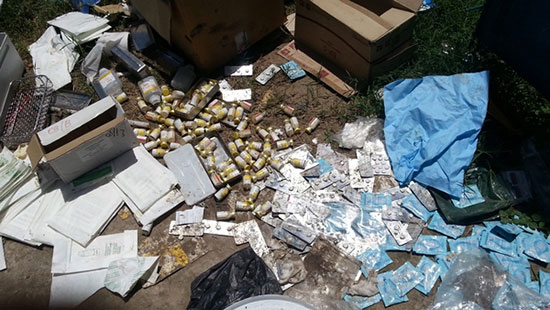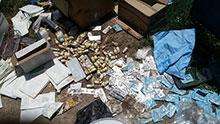The closure of an MSF hospital in Pibor Town leaves 100,000 people without medical care in Jonglei State.

South Sudan 2013 © Vikki Stienen/MSF
Destroyed medical supplies litter the ground outside the MSF hospital in Pibor.
BRUSSELS/NEW YORK, May 16, 2013—The international medical humanitarian organization Doctors Without Borders/Médecins Sans Frontières (MSF) today strongly condemned the deliberate damage and looting of its hospital in Pibor town, in South Sudan's Jonglei State, which has left tens of thousands of people without access to essential medical care.
The hospital's infrastructure was systematically damaged May 11–12 in order to render it unusable without major repairs. Therapeutic medical food and hospital beds were looted. The MSF structure is the only hospital facility for Pibor County, with the nearest alternative more than 90 miles away. The hospital's closure leaves roughly 100,000 people cut off from health care. Many of them have fled to the bush amid conflict between the South Sudan Army (SPLA) and the David YauYau armed militia group.
"A special effort was made to destroy drug supplies by strewing them on the ground, to cut and slash the warehouse tents, to ransack the hospital wards, and even to cut electricity cables and rip them from the walls," said Richard Veerman, MSF operations coordinator for South Sudan.
From January to March, the Pibor hospital treated 3,000 people and provided surgical care to more than 100 people suffering war-related injuries, including SPLA soldiers. Prior to the attack, MSF was forced to suspend activities in Pibor on April 19 because of threats and intimidation of staff and patients.
"The rainy season has just started and we know from previous years that malaria and respiratory diseases such as pneumonia will start to claim lives if there is no health care available," Veerman said. In a report issued in November last year, South Sudan's Hidden Crisis, MSF documented the devastating health consequences when people are forced to flee to the bush.
An MSF team was preparing to return and restart medical activities when the looting and destruction took place. It was the sixth time an MSF medical facility has been looted or damaged in Jonglei State in the past two years.
"It is unthinkable that there will be no health care whatsoever for the next six months for some 100,000 frightened and vulnerable people hiding in the swamps," Veerman said. "Unless we can return to resume medical activities and have the freedom to move to wherever people need assistance, this unthinkable scenario may become the horrific reality."
MSF urges the Government of South Sudan to meet its responsibilities to ensure full respect of medical humanitarian facilities and activities. MSF also calls urgently for assurances from all parties in the Jonglei State conflict that its medical teams have unhindered freedom to return to Pibor and the ability to reach out impartially to people in need of medical assistance, on either side of the conflict. Humanitarian and medical assistance is urgently needed in Pibor County and must be resumed in the coming days or weeks.
MSF works in Akobo, Nyirol, Pibor, and Uror counties in Jonglei State. The activities in all locations, including Gumuruk Clinic in Pibor County, continue to function, with the exception of the hospital in Pibor town and the MSF clinic in the village of Lekwongole in Pibor County, which was targeted and damaged in August 2012 and where insecurity and fighting have made access impossible for MSF.




